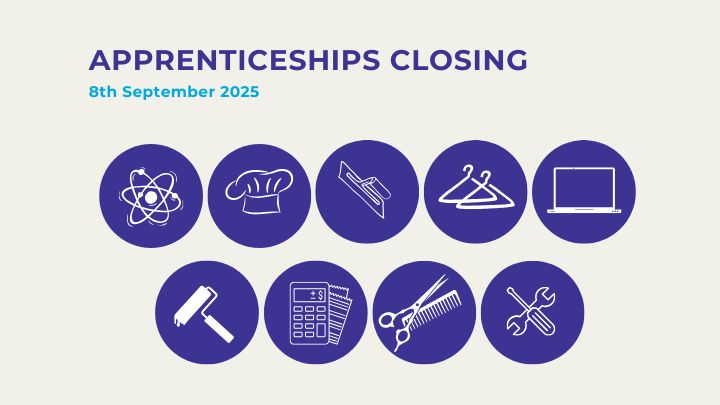In Summary
As a social worker, you must be committed to working with people and helping them solve their problems. A sympathetic and caring nature is essential, along with the ability to empathise with clients and earn the trust of individuals from all kinds of backgrounds.
Social Work apprentices will learn about social work theory and practice skills, human development, child and family welfare, safeguarding adults at risk, domestic, sexual and gender-based violence, law and social policy, and research. UCC is the lead education partner and has a dedicated UCC Social Work page .
View the Social Work Apprentice Handbook for more details on this apprenticeship.
View Occupation Profile from Apprenticeship.ie
To view full details of this occupation, view information from our Careers database for the following occupation: Social Worker
Entry Requirements
To become a social work apprentice, you must meet the eligibility criteria for the programme, apply for an apprenticeship vacancy with a SOLAS-approved employer, and successfully complete each stage of the recruitment process.

View the Social Work Apprentice Handbook for more details on this apprenticeship.
To find an apprenticeship, you can search for vacancies on the Apprenticeship Jobs page . Vacancies can be filtered by location and apprenticeship type. Further information about the programme is available on the UCC Social Work Apprenticeship website .
Training
This two-year apprenticeship programme is structured for blended delivery, combining online learning with face-to-face sessions, which minimises time off the job. You will benefit from small class sizes when on campus, and the learning and teaching methods will support you in applying your knowledge through activities such as small group work, role-plays, student presentations, and report-writing tasks

You will be trained and assessed both on and off the job. Further information on the Master of Social Work course structure and modules is available on the UCC Social Work Apprenticeship page .
Details on the Postgraduate Diploma in Social Work Studies course structure and modules can be found on the Social Work Apprenticeship course structure page .
View the Social Work Apprentice Handbook for more details.
To ensure your apprenticeship journey is successful and that you are fully supported in achieving your best in social work, a range of supports are available, including:
- Dedicated workplace and college mentors.
- Peer learning opportunities both on and off the job.
- One-to-one meetings with mentors and tutors to support your learning and development.
- Full access to all student services as a registered student, including a Student Support Officer, Student Health and Wellbeing, the Skills Centre, Clubs and Societies, and more.
- Small class sizes to encourage group and peer learning.
- Access to employee supports, including HR and employee health and welfare services.
Skills & Qualities
As a social worker, you must be committed to working with people and supporting them in addressing their problems. A sympathetic and caring nature is essential, along with the ability to empathise with clients and gain the trust of individuals from diverse backgrounds.
Strong communication skills are vital. You should be able to listen attentively and ask appropriate questions to better understand a client’s needs. Report writing is an essential skill, and you will likely require basic IT skills to produce clear and accurate reports.
Social workers must be observant, capable of reading situations, and identifying issues. While it is important to remain non-judgemental and avoid imposing solutions, you must also be prepared to make difficult decisions and uphold the law. You need to be firm and able to act swiftly and calmly—for example, if you believe a child is at risk of abuse or neglect.
You will also need strong negotiation skills, not only in working with clients but also when coordinating support services from other local authority departments or external agencies.
This career can be both emotionally and intellectually demanding. Some individuals may react with hostility and perceive your involvement as unwelcome. For example, some may view you as an interfering 'do-gooder' with no right to get involved in their lives. You must be resilient and avoid becoming overwhelmed by the challenges you encounter. The ability to de-escalate potentially confrontational situations with a calm, firm, and professional approach is crucial.
![]()
Key Competencies and Values for Social Work Practice:
- Strong organisational and planning skills
- Excellent interpersonal and interprofessional communication skills
- Professionalism and the ability to work effectively with service users and across disciplines
- Robust assessment, evaluation, and problem-solving abilities
- Effective networking skills
- Mediation and conflict resolution skills
- Anti-discriminatory and inclusive value base
- Ability to identify and assess ethical issues in practice
- Understanding of management, leadership, and relevant regulatory and legislative frameworks
- A strong orientation towards teamwork and peer supervision
- Ability to practise with professional autonomy and accountability
- Proficiency in effective and appropriate communication
- Capacity to engage in collaborative practice and multidisciplinary teamwork
- A firm commitment to safety and quality in both the workplace and in social work practice
- Demonstration of professionalism through integrity, objectivity, competence, service-user focus, due care, and confidentiality
- Strong advocacy skills and promotion of service-user self-determination
- Competence in assessment, evaluation, and intervention, including risk analysis and management
- A respectful and responsive approach to service delivery
- Ability to manage workload and multitask effectively
- Awareness of the limits of one's own knowledge and skills
- Application of best practice principles in social work
- Adherence to all relevant legislative and regulatory frameworks
Work Activities
As a social worker, you will learn to support service users and collaborate with allied professionals to find solutions and effect positive change. The challenges that social workers address span the entire life cycle and affect all areas of society. These issues may involve responding to a crisis or emergency, or offering support, information, and advice to help individuals cope with ongoing difficulties or personal loss.
Social workers engage with individuals and groups, commonly referred to as clients. Clients may include ethnic minority groups, young and adult offenders, children and families, members of the Traveller community, older people, people experiencing homelessness, the unemployed, and those affected by substance misuse.
Some social workers specialise in supporting individuals living with HIV/AIDS, mental health issues, or disabilities. Social workers often operate as part of a multidisciplinary team covering a specific geographical area.
Daily Activities May Include:
- Empowering individuals, families, and communities to address a range of challenges across the life span—for example, supporting those experiencing child or elder abuse, disability, mental health issues, addiction, homelessness, discrimination, or reintegration after involvement with the criminal justice system.
- Researching and contributing to the development of policies, legislation, and interventions to respond to complex social needs.
- Conducting comprehensive, holistic assessments of individuals, their environments, and the strengths and challenges they face.
- Identifying, implementing, and evaluating interventions such as individual counselling, family support, community engagement, risk assessment, crisis intervention, and advocacy.
- Collaborating effectively with professionals and stakeholders from health, social care, and legal sectors, working across diverse care setting.
Career Progression
The main pathways for continuous professional development (CPD) for practitioners in social work include engagement with the professional body’s CPD requirements, reflective practice, and regular supervision
CPD Irish Association of Social Workers
Some social workers go on to engage in research and publish work on practice after qualification, focusing on their chosen area within the field of social work.
On successful completion of the proposed apprenticeship, the social worker will meet the standards of proficiency set by the statutory regulator, CORU* , and will be eligible to register as a professionally qualified social worker in Ireland.
*CORU: Coimisiún na nOibreacha Rialála um Ghairmithe Sláinte agus Cúraim Shóisialaigh (Commission for the Regulation of Health and Social Care Professionals)
CORU is the regulatory body in Ireland responsible for overseeing the registration, education, and professional standards of health and social care professionals, including social workers.
Current Standards of Proficiency for Social Workers (as set by CORU):
• Professional Autonomy and Accountability
• Communication, Collaborative Practice and Team working
• Safety and Quality
• Professional Development
• Professional Knowledge and Skills
• Apply knowledge of social systems and human behaviour to promote social change, problem solving in human relationships and the empowerment of people.
• Respond to the impact of social and political contexts on service users and social work.
• Implement the values and ethics of the profession of social work.
• Promote social justice, human rights, and anti-oppressive practice.
• Apply research, theory, legislation, policy to assessment, and intervention in practice.
• Work effectively with other professions from health, social, legal, and criminal justice services.
Getting this Apprenticeship
To become an apprentice in Ireland, you must be hired by an employer. Apprenticeship employers are formally approved by SOLAS in advance of employing apprentices. Apprentices get a formal contract of employment as part of their apprenticeship.
To find an apprenticeship, you can search apprenticeship vacancies and a list of currently approved apprentice employers on the Apprenticeship Jobs & Employers Portal . You can search for vacancies by location and employer in each apprenticeship.
Explore a list of Approved Employers by Region and by Apprenticeship Type .
Further Information Contact Details
Loretta Brady
Apprenticeship Project Manager
University College Cork
Tel: 085 1225851
Email: [email protected]
Web: http://www.ucc.ie/en/apprenticeships/sw/
Finding an Employer
Finding an employer or registering your interest with an official Coordinating Provider is one of the first things you need to do to start an apprenticeship.
To find an apprenticeship and secure an apprenticeship work contract you can search apprenticeship vacancies on the Apprenticeship Jobs Portal . You can search for vacancies by location and by apprenticeship type.
Your local Education and Training Board may also hold details of employers seeking to employ an apprentice.
You should also directly connect with local employers who might be interested in taking on an apprentice. It is a great idea to get a part time job with a local employer who might be more inclined to take you on as an apprentice following a successful work experience placement or a part time job contract.
Further information about this apprenticeship may be available from the following organisations on this website:
Online Job Sites
Here are some direct links to employment websites that frequently list apprenticeship vacancies.
Note: These websites may include vacancies that are not QQI accredited Apprenticeships.
Pay & Fees
Apprentices complete their off-the-job training in a higher education institution, for which they are required to pay a student contribution.
The amount payable is a proportion of the standard annual student contribution for full-time higher education students. This contribution is paid directly to the higher education institution over the two-year duration of the programme.
Student Contribution
| Year 1 | €2,400 |
| Year 2 | €2,400 |
| Total Fee: | €4,800 |



















